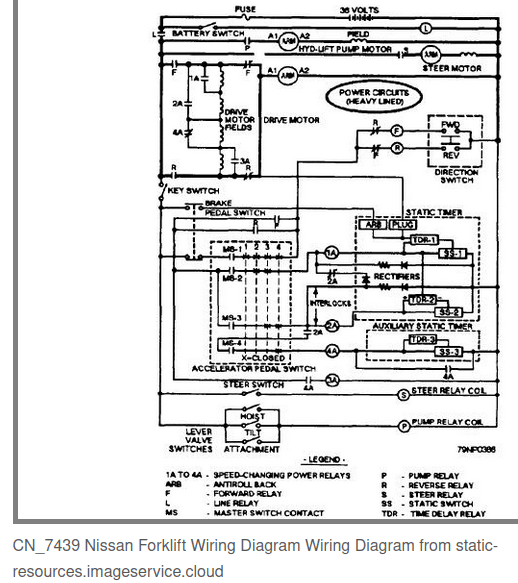Hi all,
I'm a new engineer working on upgrading a one off specialty piece of equipment. I didn't cover DC motors at all in school and I'm looking for some advise/reflection with a DC motor system design.
This machine was designed multiple decades ago and has had a few redesigns/upgrades, but as I got it had an unlabeled forklift DC motor off of a 72V battery with a resistor in series (our guess is to reduce motor voltage to 48V). In our new application, the battery we have available is 96V. My calculated peak hydraulic power required is 6-7 HP so I looked for a 10HP 96V motor but it seemed 72V motors were the highest voltage commonly available at this horsepower range.
As it stands now, I'm waiting on delivery of a 72V 10HP+ forklift motor and 95A capacity resistors such that the circuit can be tested with 0.2, 0.4, 0.6, or 0.8 ohms until we measure motor voltage close to 72V. I was told the motor was designed specifically by a forklift company so the specifications of it aren't available. Because rpm is unknown, my plan is to choose the pump size by testing; I have two pumps (of known displacements) that will mate to this motor, so I will see how the system behaves with each and buy another if neither gets my desired flow rate.
I think I have a path forward here, but I just remembered this forum exists so I wanted to ask a few questions. If anyone could help with one or some of these questions I would be very grateful.
[ol 1]
[li]Is there a way for me to calculate the required resistor size? The only way I got my 0.2-0.8 ohm range is by looking at the old resistor.[/li]
[li]Does my hydraulic pump testing plan sound reasonable (given the hole I've dug myself into), or is there a way I can get motor RPM to choose a pump displacement?[/li]
[li]I think both my resistance and hydraulic issue are self inflicted from buying a forklift (no specs) motor but it was the only one I could find. Did I miss an easy supplier or are motors this size just very uncommon? [/li]
[li]Why can't I find much online about reducing a battery voltage with resistor to run a DC motor? I understand it is power inefficient (not a problem in this design, battery capacity >> motor draw), but is there an easier way to power a 72V motor with a 96V battery?[/li]
[li]If I had more time/budget, what would I look for to upgrade this to an AC induction motor? DC motors this size seem scarce/expensive and the speed varying with load doesn't seem ideal for hydraulic systems. Looking for inverter systems at this kW range seemed to mostly yield units designed for household solar applications.[/li]
[/ol]
Thanks
I'm a new engineer working on upgrading a one off specialty piece of equipment. I didn't cover DC motors at all in school and I'm looking for some advise/reflection with a DC motor system design.
This machine was designed multiple decades ago and has had a few redesigns/upgrades, but as I got it had an unlabeled forklift DC motor off of a 72V battery with a resistor in series (our guess is to reduce motor voltage to 48V). In our new application, the battery we have available is 96V. My calculated peak hydraulic power required is 6-7 HP so I looked for a 10HP 96V motor but it seemed 72V motors were the highest voltage commonly available at this horsepower range.
As it stands now, I'm waiting on delivery of a 72V 10HP+ forklift motor and 95A capacity resistors such that the circuit can be tested with 0.2, 0.4, 0.6, or 0.8 ohms until we measure motor voltage close to 72V. I was told the motor was designed specifically by a forklift company so the specifications of it aren't available. Because rpm is unknown, my plan is to choose the pump size by testing; I have two pumps (of known displacements) that will mate to this motor, so I will see how the system behaves with each and buy another if neither gets my desired flow rate.
I think I have a path forward here, but I just remembered this forum exists so I wanted to ask a few questions. If anyone could help with one or some of these questions I would be very grateful.
[ol 1]
[li]Is there a way for me to calculate the required resistor size? The only way I got my 0.2-0.8 ohm range is by looking at the old resistor.[/li]
[li]Does my hydraulic pump testing plan sound reasonable (given the hole I've dug myself into), or is there a way I can get motor RPM to choose a pump displacement?[/li]
[li]I think both my resistance and hydraulic issue are self inflicted from buying a forklift (no specs) motor but it was the only one I could find. Did I miss an easy supplier or are motors this size just very uncommon? [/li]
[li]Why can't I find much online about reducing a battery voltage with resistor to run a DC motor? I understand it is power inefficient (not a problem in this design, battery capacity >> motor draw), but is there an easier way to power a 72V motor with a 96V battery?[/li]
[li]If I had more time/budget, what would I look for to upgrade this to an AC induction motor? DC motors this size seem scarce/expensive and the speed varying with load doesn't seem ideal for hydraulic systems. Looking for inverter systems at this kW range seemed to mostly yield units designed for household solar applications.[/li]
[/ol]
Thanks

